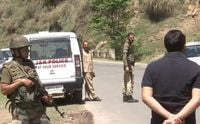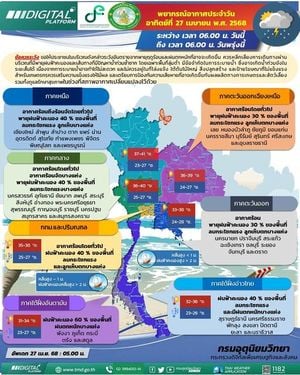In a sweeping response to the deadly terror attack in Pahalgam, Jammu and Kashmir, the Indian government has announced a comprehensive revocation of all visas issued to Pakistani nationals, effective April 27, 2025. This decision comes in the wake of the tragic incident on April 22, which claimed the lives of 26 people, primarily tourists, and has raised significant security concerns across the nation.
On Thursday, April 24, the Ministry of Home Affairs declared that all categories of visas for Pakistani citizens would be rescinded, except for long-term, diplomatic, and official visas. Medical visas, however, will remain valid only until April 29, 2025. Delhi Chief Minister Rekha Gupta highlighted her government's commitment to enforcing this directive, stating, "No new visas will be issued to Pakistani nationals henceforward. The Delhi Government is ensuring strict compliance with these orders. Every violation is being sincerely tracked, and necessary action will follow." Gupta's remarks underscore the urgency and seriousness with which the government is approaching the situation.
The Pahalgam attack, which took place at the popular Baisaran meadow, shocked the nation and prompted immediate action from the central government. Union Home Minister Amit Shah has been actively coordinating with chief ministers across the country, instructing them to identify and deport Pakistani nationals residing in their states. The directive is part of a broader national security initiative aimed at tightening border controls and regulating the presence of foreign nationals in India.
In a statement, Amit Shah emphasized the need for strict enforcement of the new visa regulations, urging all state governments to act swiftly. On April 25, he reached out to various state leaders, including Haryana Chief Minister Nayab Singh Saini, who echoed these sentiments. Saini directed local officials to ensure that no Pakistani national remains in Haryana past the deadline set by the central government.
Following the attack, the Doda district administration also took swift action, mandating that all Pakistani nationals residing in the area leave the country. They were instructed to contact the Foreigners' Registration Office (FRO) to submit necessary documentation and comply with the government's timeline. A notification from the Doda administration stated, "All Pakistani nationals are required to contact their Foreigners' Registration Office in SSP Office, Doda and submit all necessary documents and papers. Pakistani nationals are directed to strictly follow the timeline mentioned in the said Government Order for leaving India." This local enforcement reflects the nationwide effort to address security concerns.
In light of the recent events, the Indian government has also advised Indian nationals currently living in Pakistan to return home as soon as possible. This move is seen as a precautionary measure to ensure the safety of Indian citizens abroad, especially in the wake of rising tensions and security threats.
The Pahalgam attack has not only led to immediate policy changes but has also reignited discussions around national security and the presence of foreign nationals in India. Political leaders across the spectrum have voiced their support for the government's measures, emphasizing the need for vigilance and protection of citizens.
As the deadline for Pakistani nationals approaches, many are left to navigate the complexities of visa regulations and the implications of the government's directive. The atmosphere is charged with uncertainty, as individuals and families face the reality of leaving or potentially being deported from the country.
While the Indian government maintains that these measures are necessary for national security, critics argue that such sweeping actions could lead to discrimination and unnecessary hardship for innocent individuals caught in the crossfire of geopolitical tensions. The balance between security and humanitarian considerations remains a contentious topic as the situation unfolds.
In the aftermath of the Pahalgam tragedy, the Indian government is under pressure to ensure the safety of its citizens while also maintaining diplomatic relations with neighboring countries. The revocation of visas for Pakistani nationals is a clear indication of the government's zero-tolerance policy towards terrorism and its commitment to safeguarding national interests.
As India grapples with the repercussions of the Pahalgam attack, the focus will likely remain on security measures and how they impact foreign relations. The coming days will be critical in determining how effectively the government can enforce these new policies while addressing the concerns of those affected.
In conclusion, the revocation of visas for Pakistani nationals marks a significant shift in India's approach to border security and counter-terrorism efforts. With the April 27 deadline looming, the government is poised to take decisive action to ensure compliance, reflecting a broader commitment to national safety in the face of adversity.




